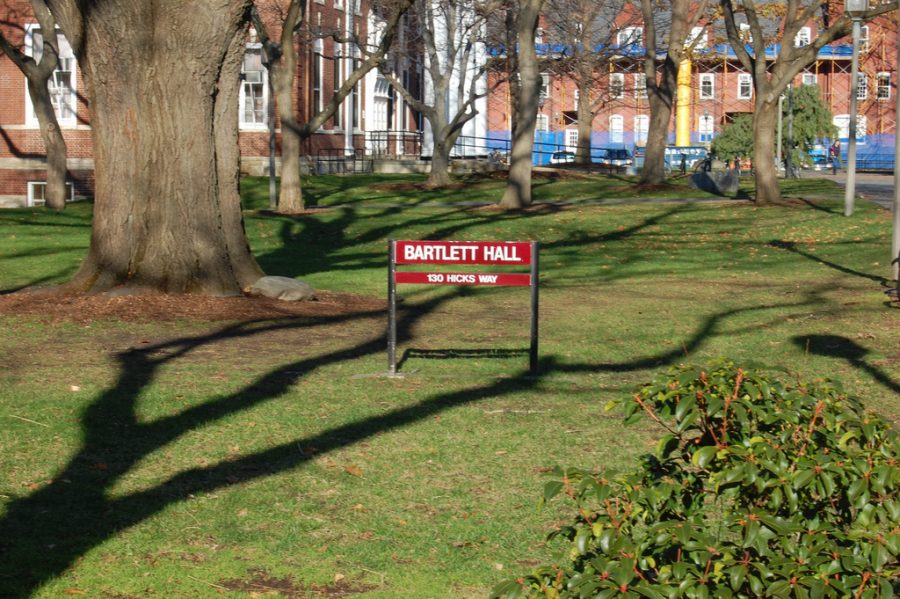In an attempt to combat student food insecurity at the University of Massachusetts, Alpha Pi Omega, the Student Government Association and the Graduate Student Senate developed the anonymous and free Student Food Pantry.
Molly Hansen, a second-year graduate student in the higher education administration program and co-chair of the GSS food security committee was one of the initiators of the pantry. She explained that the new pantry is all non-perishable food items, and students may take up to four items per visit along with two additional items per household.
Housed in Bartlett Hall 317b, the new Student Food Pantry is accessible to all students on campus. It is open five days a week, with additional hours exclusively for graduate students.
“We created these hours so that graduate students may have additional privacy, so they do not have to worry about running into undergraduate students they teach or supervise,” said Hansen.
Timothy Scalona, the chair of the SGA social justice and empowerment committee, said that the pantry acts as a first step toward tackling a larger issue of food insecurity on campus.
“The pantry will show the importance of tackling food-insecurity on campus amidst the fight for [number one dining],” said Scalona. “In addition, it will show the administration the need to support students from low-income or food-insecure communities whose narratives are sometimes left underrepresented, their needs left unsupported.”
Hansen also added that many students find that a lack of food due to the price of meal plans can contribute to poor performance in the classroom and in social activities.
“I strongly believe that food insecurity is an issue that impacts every aspect of a person’s life and ability to succeed,” Hansen said. “Having a food pantry allows for students to feed themselves, and sometimes their families, so that they can study, work and engage in social activities.”
“I was motivated to help build the pantry because I know for a fact that this is an issue that impacts my peers. This food pantry will help students who are struggling to make ends meet, and will hopefully allow them to continue in school and pursue professional opportunities,” Hansen continued.
Anna Drexler, a sophomore public health and women, gender and sexuality studies double major helped pioneer the pantry last semester.
“Last semester, my fraternity Alpha Phi Omega started the pantry out of our office in the Student Union. It wasn’t feasible to have it there long term, so when we moved to Bartlett because of the renovations of the Student Union, I decided to start the pantry independent of our organization. We asked the SGA and GSS for help, and got connected with the admin,” Drexler said.
The cost of University dining plans was a recurring theme for many individuals involved with the project.
“I hope [the pantry] has the lasting effect of making this campus a little more accessible for all types of students. Our ranking as number one dining can alienate those who do not want to or cannot afford to pay premium prices for extravagant meals,” Scalona said. “The University should look to the mere presence of a student food pantry to represent their need to make meal plans far more affordable and accessible.”
All donations are anonymous, and anyone is free to donate to the pantry. Non-perishable foods, toiletries and other household items may be donated.
The next campus-wide food drive will take place on Dec. 7 in the Whitmore Administration Building and Bartlett.
Editor’s note: Timothy Scalona is a contributor for The Massachusetts Daily Collegian.
Barkha Bhandari can be reached at [email protected].




















Stephanie Higgins • Dec 3, 2018 at 5:23 pm
I don’t think anyone is turned away from the student food pantry, but one concern with starting this pantry was targeting student food insecurity which is often overlooked. The Amherst Survival Center is more readily equipped for families and has a wider range of resources for people in the community generally, and I think the student food pantry is trying to expand on these resources rather than attempting to serve a wider population better served by ASC.
Stephanie Pasternak • Nov 29, 2018 at 1:04 pm
A food pantry is a wonderful idea.
I’m wondering if the food pantry would also be available to non-matriculated low-wage workers and employees on campus? Invisible to many students, it is low wage workers who keep the UMass cafeterias running, as well as other aspects of campus life. Many are immigrants. They are the ones who suffer from PVTA cuts as well as the bus is often the only way they get to work. Like many of the working poor- they live on the margins and in poverty not by choice, but by necessity.